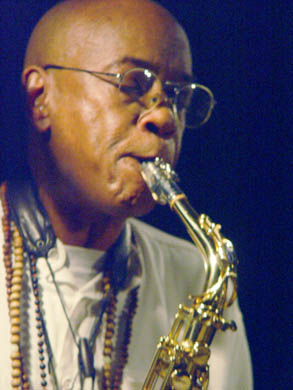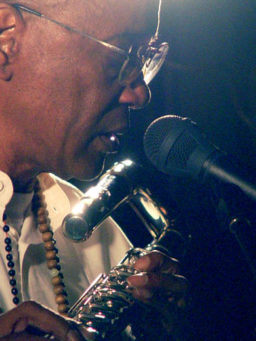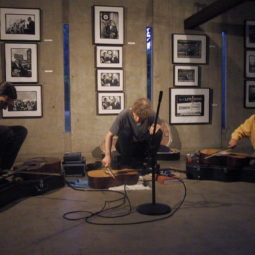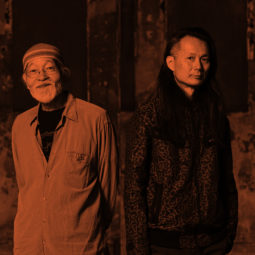 Joseph Jarman is cofounder of Chicago’s famed AACM (Association for the Advancement of Creative Musicians) founded in 1965 and a member of the Art Ensemble of Chicago from 1969 to 1993. He has performed, toured and recorded in all parts of the Western world as well as in Japan and Eastern Europe. In 2001 he was invited by the Mayor of Chicago as an honored guest composer and performer, and to the Dogen Country in Mali by invitation of the French Consulate for a special project of music and art with Dogen artists and Western Artists (Leroy Jenkins, Thomas Buckner, and Alain Kirili).
Joseph Jarman is cofounder of Chicago’s famed AACM (Association for the Advancement of Creative Musicians) founded in 1965 and a member of the Art Ensemble of Chicago from 1969 to 1993. He has performed, toured and recorded in all parts of the Western world as well as in Japan and Eastern Europe. In 2001 he was invited by the Mayor of Chicago as an honored guest composer and performer, and to the Dogen Country in Mali by invitation of the French Consulate for a special project of music and art with Dogen artists and Western Artists (Leroy Jenkins, Thomas Buckner, and Alain Kirili).
Best known as a saxophonist, Mr. Jarman plays all the woodwinds and many percussion instruments, including vibes, marimba, balophone, and an array of bells, gongs and little instruments. Mr. Jarman has also worked extensively in Music/theater and is largely responsible for its development as a means of expression in new music. As a writer and poet, Joseph Jarman has published in Black Scholar, Dada Artist, New World and other books and magazines. He has also written the liner notes for many Art Ensemble of Chicago recordings.
Mr. Jarman studied music at the Chicago Conservatory of Music and Chicago Teachers College. He has been awarded numerous fellowships and grants, including several NEA grants, New York State Council grants for composition. In 1984 he received an interacts grant with Jessica Hagdorn, Blondell Cummings and John Woo for The Art of War. He also had a grant in 1999 from the British Arts Council. Mr. Jarman has received numerous first place awards from Downbeat Critics Polls. He is a member of the National Jazz Educators, Composers Forum, and Jazz Institute of Chicago (Life member). Mr. Jarman is an honorary lifetime member of the Chicago Jazz Society and is an honorary citizen of the city of Atlanta, GA and Madison, Wisconsin.
In 1990 Mr. Jarman was ordained a Jodo Shinshu Buddhist Priest and also holds the rank of Godan (5th degree) black belt in the martial art of Aikido. He now directs the Jikishinkan Aikido Dojo and Brooklyn Buddhist Association. Mr. Jarman’s most recent recordings include Pachinko Dream track 10 on Music @ Arts Records; Return of the Lost Tribe – Delmark Records; Out of the Mist – Ocean records; and Lifetime Visions for the Magnificent Human – Bopbuda Music.
Henry Alonzo Grimes was born in Philadelphia, to parents who both had been musicians in their youth. He took up the violin at the age of 12, then began playing tuba, English horn, percussion, finally switching to the double bass at Mastbaum Technical High School. He furthered his musical studies at Juilliard and established a reputation as a versatile bassist by the mid-1950s. He recorded or performed with saxophonists Gerry Mulligan and Sonny Rollins, pianists Thelonious Monk and McCoy Tyner, singer Anita O’Day, clarinetist Benny Goodman and many others. At a time when bassist Charles Mingus was experimenting with a second bass player in his band, Grimes was the person he selected for the job. One of his earliest appearances on film is captured in the Bert Stern documentary on the Newport Jazz Festival of 1958, Jazz on a Summer’s Day. Grimes was 22 years old, and as word spread among the musicians about his extraordinary playing, he ended up playing with six different groups in the festival that weekend: those of Benny Goodman, Lee Konitz, Thelonious Monk, Gerry Mulligan, Sonny Rollins, and Tony Scott. And though Henry’s name never even appeared in the festival’s printed program, New York Times critic Bosley Crowther took note of the remarkable young bassist and listed him as one of the festival’s primary players.
Gradually growing interested in the burgeoning free jazz movement, Grimes performed with most of the music’s important names, including pianist Cecil Taylor, trumpeter Don Cherry, saxophonists Steve Lacy, Pharoah Sanders, Archie Shepp, and Albert Ayler. He released one album, The Call, as a trio leader for the ESP-Disk record label in 1966. The album features Perry Robinson on clarinet and drummer Tom Price and is considered to be representative of his career at that time.
After more than a decade of activity and performance, notably as a leading bassist in free jazz, Grimes completely disappeared from the music scene by 1970. Grimes was often presumed to have died, but he was discovered in 2002 and returned to performing.
Percussionist-composer Alex Cline has been a mainstay on the jazz and new music scenes of Los Angeles for over twenty-five years. Combining colorful and sensitive percussion sounds with a drumming foundation based in the jazz tradition, Cline is recognized for his contributions to the music of such artists as Vinny Golia, Julius Hemphill, Bobby Bradford, Horace Tapscott, Wadada Leo Smith, Charlie Haden, and countless others. His work as a composer and bandleader has been documented on recordings with his groups, the Alex Cline Ensemble and Alex Cline’s Band of the Moment. Cline was included in Michael Bettine and Trevor Taylor’s book Percussion Profiles among twenty of the “world’s most creative percussionists.”



